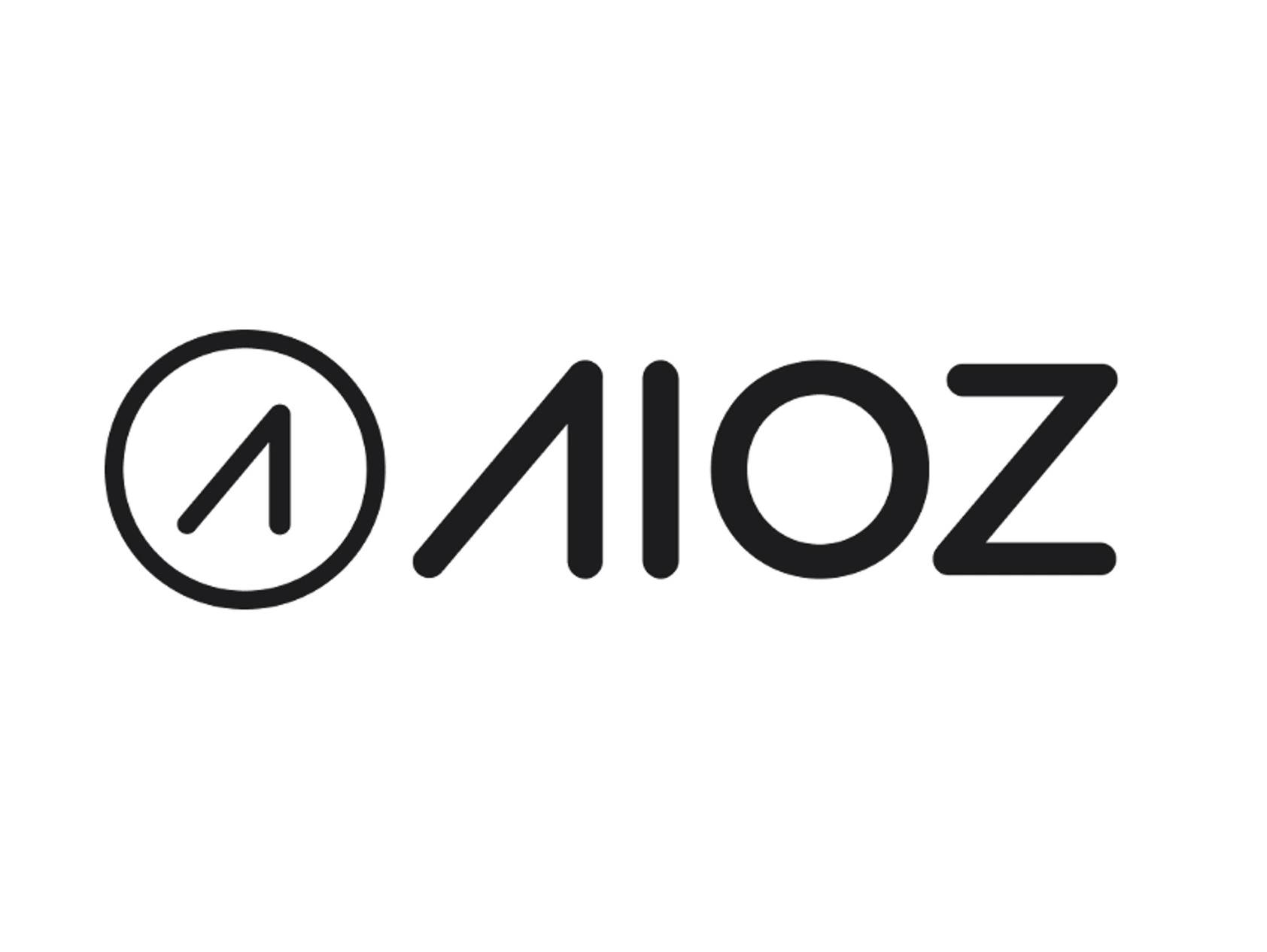Subscribe to wiki
Share wiki
Bookmark
AIOZ Network
The Agent Tokenization Platform (ATP):Build autonomous agents with the Agent Development Kit (ADK)
0%
AIOZ Network
AIOZ Network, founded by Erman Tjiputra and based in Singapore, functions as an infrastructure solution for web3 storage, decentralized AI computation, and video services. It aims to address the increasing global demand for dependable solutions in file storage and content delivery in the context of a shifting digital landscape.[1][2]
Overview
AIOZ Network, established in 2018, functions as a Layer-1 interoperable multichain Web3 content delivery network powered by peer-to-peer edge nodes. With over 36,000 edge nodes and significant user engagement on AIOZ Tube, the platform aims to address storage and streaming challenges. AIOZ Network is a Web3 infrastructure supporting dApps through its blockchain and dCDN components.[1][3]
AIOZ Blockchain
AIOZ Network's blockchain combines elements from Cosmos and Ethereum Virtual Machine (EVM), emphasizing efficiency and adaptability. Using Tendermint core and delegated Proof of Stake (dBFT), it supports decentralized applications (dApps) with streamlined transactions and scalability at low costs. Its multichain design aims to enable integration with various EVM chains and Cosmos-based chains, intended to promote asset and data transfer between different blockchain ecosystems. The platform supports standard smart contract languages, like Solidity and Web Assembly, offering developers flexibility for cross-platform application development.[4][5]
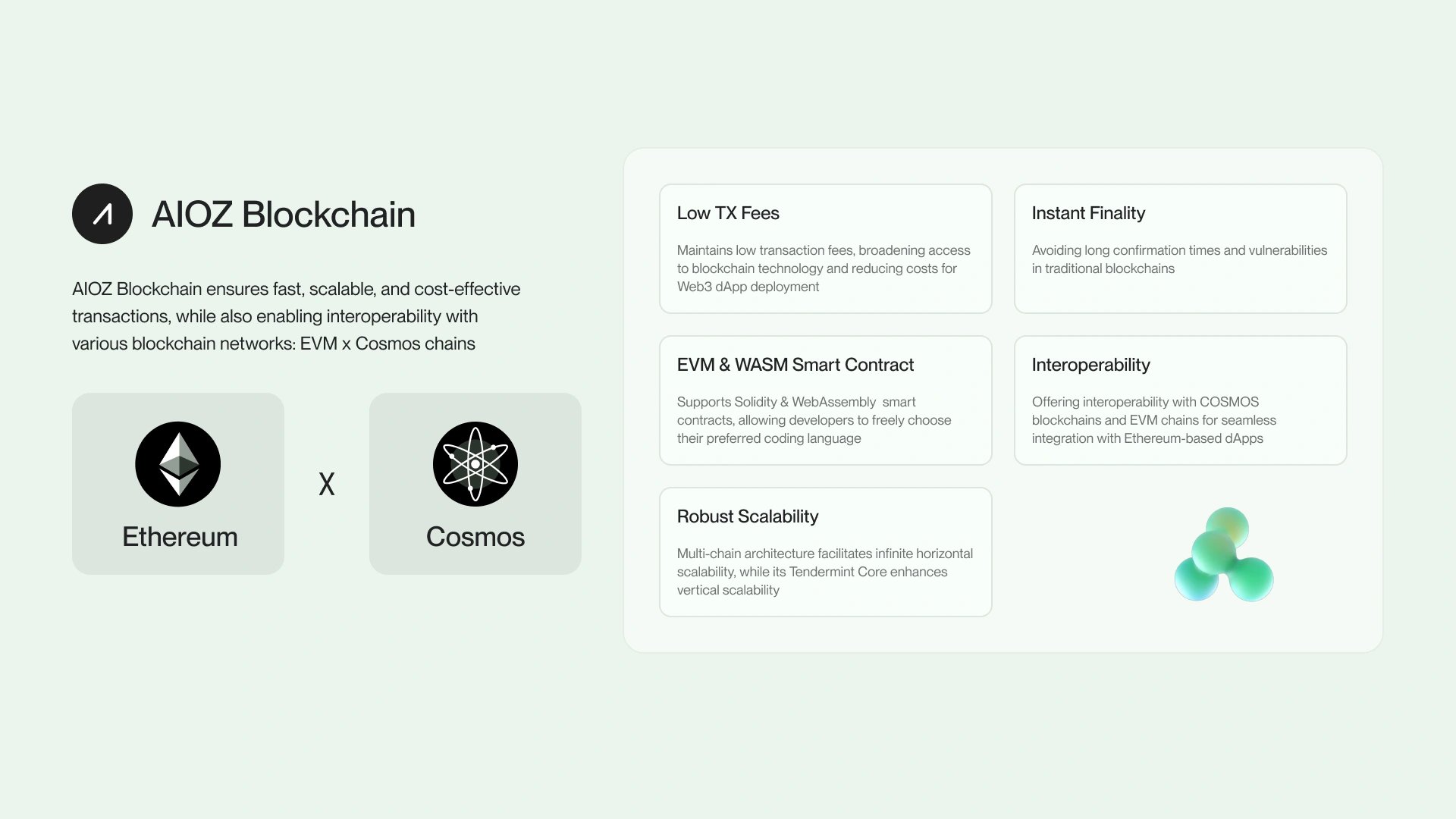
AIOZ dCDN
AIOZ Network's dCDN platform aims to address challenges in economical file storage and distribution for Web 3.0 dApps. By utilizing AIOZ Edge Nodes and peer-to-peer nodes, the platform intends to establish efficient and cost-effective content delivery, with participants potentially receiving rewards in $AIOZ tokens. Participants, incentivized with $AIOZ tokens, are encouraged to contribute to the platform's goal of secure and decentralized content delivery through AIOZ Edge Nodes. In the metaverse space, AIOZ Network dCDN intends to support high-bandwidth, low-latency, and cost-effective content delivery, fostering potential immersive experiences and contributing to the evolution of virtual environments within dApps.[6][7]
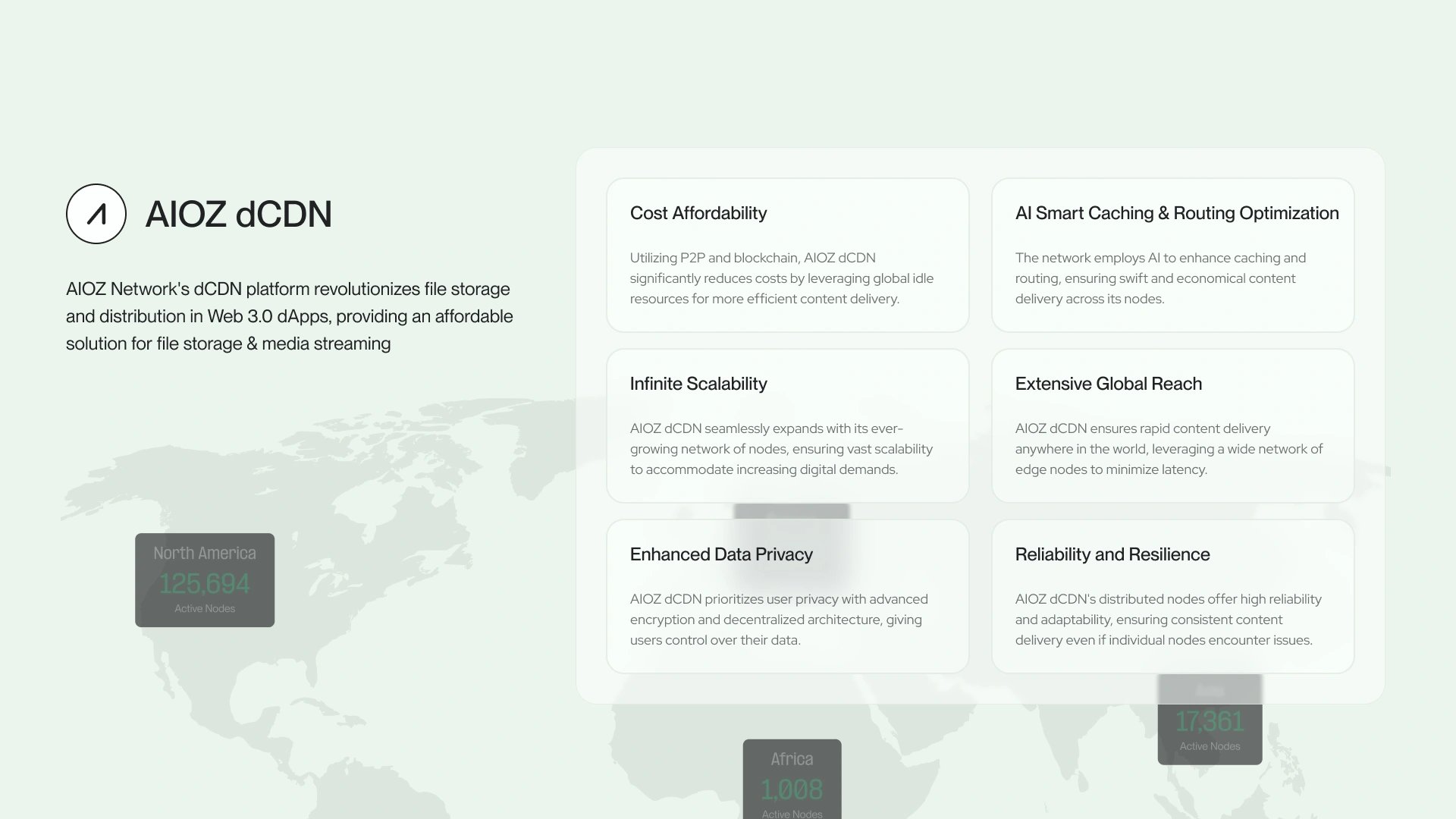
AOIZ Web3 Services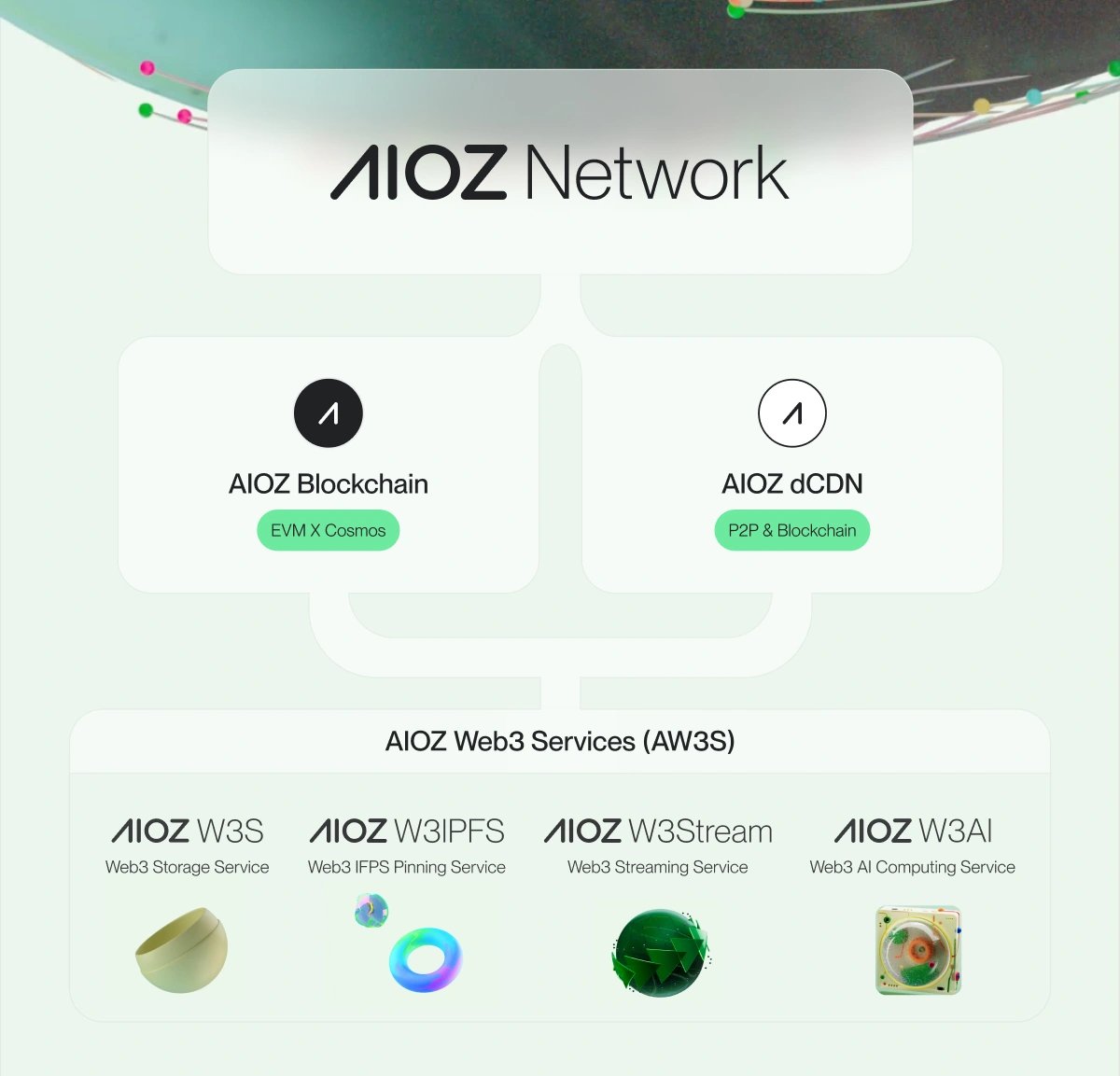

AIOZ Web3 Storage
AIOZ Web3 Storage (W3S) serves as an Object Storage Infrastructure compatible with S3 for Web3 decentralized applications (dApps). Utilizing AIOZ Network's decentralized features and peer-to-peer networking, AIOZ W3S aims to provide secure, distributed, and cost-effective cloud object storage.[8][9]
Features
AIOZ Web3 Storage (W3S) aims to integrate seamlessly with Amazon's Simple Storage Service (AWS S3), offering users flexibility. By using a distributed approach, W3S intends to ensure global data availability, minimizing the risk of a single point of failure. In addressing decentralized network challenges, W3S strives to prioritize efficient data access, contributing to improved operational efficiency. Its intended scalability allows adaptation to users' changing storage needs. W3S's decentralized structure aims to enhance user privacy through advanced encryption, emphasizing user control over data access. Leveraging AIOZ Network's global peer-to-peer nodes, W3S aims to function as a built-in Content Delivery Network (CDN), facilitating data delivery without extra fees. The platform's transparent pricing intends to simplify budgeting for users. Additionally, W3S introduces paying with AIOZ tokens, intending to streamline transactions with a pay-as-you-go model for users, emphasizing cost-effectiveness.[8][9]
Uses
AIOZ Web3 Storage serves various sectors with practical applications. It aims to provide secure storage for substantial content in media and entertainment companies, offering high availability and swift delivery for e-commerce platforms. For decentralized applications (DApps), AIOZ Web3 Storage intends to offer reliable storage within decentralized ecosystems, while blockchain projects may utilize it for decentralized and immutable storage solutions. In healthcare, AIOZ Web3 Storage intends to ensure the secure storage of sensitive medical data, aligning with healthcare data regulations. Data-driven startups may benefit from its scalability and cost-effectiveness in storing and processing large datasets. Cloud service providers can enhance data availability and reliability by integrating AIOZ Web3 Storage. [8][9]
AIOZ W3IPFS
The InterPlanetary File System (IPFS) by Protocol Labs is an open-source, peer-to-peer file-sharing system designed to enhance the web's speed and accessibility. However, IPFS faces challenges such as technical complexity and limited search capabilities. In response, AIOZ introduced AIOZ Web3 IPFS (W3IPFS) as a proposed solution, aiming to address these challenges with features like unlimited pinned files, dedicated resources, low latency, and smart caching.[10]
Features
AIOZ Web3 IPFS facilitates decentralized data storage in IPFS, aiming for distributed, secure storage for DApps. It offers an IPFS Pinning Service for data preservation and aims to simplify NFT upload and management. The platform includes a built-in CDN for efficient content distribution and dedicated gateways for reliable data access. Developers benefit from well-documented SDK and API resources, aiming to ease integration.[10]
Uses
AIOZ Web3 IPFS meets the storage needs of artists, content creators, and digital media producers on various platforms. It also serves NFT marketplaces, providing reliable and decentralized storage. Additionally, it supports NFT games, aiming to offer secure storage for game assets. In metaverse applications, AIOZ Web3 IPFS contributes to storing assets for virtual experiences.[10]
AIOZ W3AI
AIOZ W3AI aims to function as a Web3 AI computing infrastructure, intending to reshape how artificial intelligence tasks are executed for developers and businesses. Its goal is to enable decentralized AI computing, emphasizing user-centric experiences by ensuring data privacy and enhanced performance through local execution on user devices. The platform intends to provide decentralized AI model training capabilities, host a marketplace for AI models and datasets, and create dedicated spaces for developing AI-powered decentralized applications (dApps). This multifaceted approach is designed to foster a collaborative environment for model training and secure datasets, contributing to the development of decentralized applications.[11]
Features
AIOZ W3AI seeks to transform AI task execution by enabling local processing on user devices through AIOZ Nodes, prioritizing data privacy. Using distributed computing, it optimizes resource utilization and scalability. The platform aims to provide AI-as-a-Service integration via user-friendly APIs and documentation for seamless model integration. Users can access various AI models within the decentralized AI-as-a-service, covering tasks like image generation and recognition. A proof-of-computing mechanism incentivizes AIOZ Nodes, earning rewards for executing tasks. The platform intends to establish a decentralized AI marketplace for researchers to create and monetize models. Emphasizing privacy, user data remains on their devices, protected by encryption and decentralized storage. AIOZ W3AI aims for efficient resource utilization with dynamic scaling based on demand, while local AI task execution intends to minimize latency for improved user experiences.[11]
Edge Computing Solutions
AIOZ W3AI aims to optimize operations in the Internet of Things (IoT) by locally executing AI tasks, reducing the need for continuous data transmission. Developers can utilize the platform to deliver AI-powered features, prioritizing user data privacy. In e-commerce, AIOZ W3AI intends to enhance user experiences through personalized product recommendations. The platform also aims to provide a decentralized infrastructure for AI researchers and contribute to AI-powered medical image analysis in healthcare. In education, AIOZ W3AI aims to foster personalized learning experiences in e-learning platforms through on-device AI capabilities.[11]
AIOZ W3Stream
AIOZ Web3 Streaming serves as a foundational infrastructure for decentralized video streaming, providing essential tools for global content delivery. It aims to address the imbalance in revenue-sharing prevalent in centralized platforms, offering alternatives for content creators and fostering a more equitable environment.[12]
Features
AIOZ Web3 Streaming provides the essential infrastructure for video hosting, streaming, transcoding, management, and analytics. Supporting popular streaming protocols like HLS and MPEG-DASH, it intends to ensure broad compatibility. With a decentralized Content Delivery Network (dCDN) leveraging strategically positioned edge nodes, the platform aims to minimize latency and enhance content delivery reliability. It aspires to simplify integration for businesses through user-friendly APIs, SDKs, and documentation, allowing a focus on content creation. Designed for compatibility with various devices, including desktop browsers, mobile devices, smart TVs, and streaming media players, AIOZ Web3 Streaming intends to cater to diverse user preferences. Cost-effectiveness is a priority, with AIOZ W3Stream aiming to offer efficient video delivery through network optimizations.[12]
Uses
AIOZ Web3 Streaming aims to provide a versatile infrastructure for video delivery across various sectors. It intends to support video streaming platforms, media entities, and entertainment studios in achieving reliable content delivery. For e-learning, webinars, and virtual events, it strives to offer scalability and adaptive bitrate streaming. With the goal of optimizing content delivery, it supports OTT providers, enhances real-time gaming streams, and aids enterprises in secure video communication. Telecommunications companies can explore integration to potentially enhance video services while optimizing bandwidth usage.[12]
AIOZ dApps
AIOZ Network aims to underscore the functionality of its infrastructure by launching native decentralized applications (dApps). These applications demonstrate the structural integrity of AIOZ's global network, incorporating nodes, AIOZ Blockchain, AIOZ dCDN, and decentralized AI computing. The primary goal is to provide practical web3 applications for users and showcase the simplicity, affordability, safety, and economic viability of building on the AIOZ Network to developers. This strategy, along with strategic business development and partnerships with web2 and web3 clients, seeks to nurture the growth of the AIOZ Network dApp, developer, and partner ecosystems.[13]
Cross-Chain Bridge
The AIOZ Network Cross-Chain Bridge aims to serve as an interoperable gateway for the conversion of AIOZ assets across the Ethereum Network, Binance Smart Chain, and AIOZ Network. Users have the option to securely bridge AIOZ ERC-20 or AIOZ BEP-20 tokens into AIOZ Native and vice versa. This functionality is designed to support engagement within the AIOZ Network ecosystem, including infrastructure services, staking, and decentralized applications (dApps). The integration of AIOZ multichain assets is intended to enhance the cross-chain user experience, to foster the adoption of AIOZ.[19]
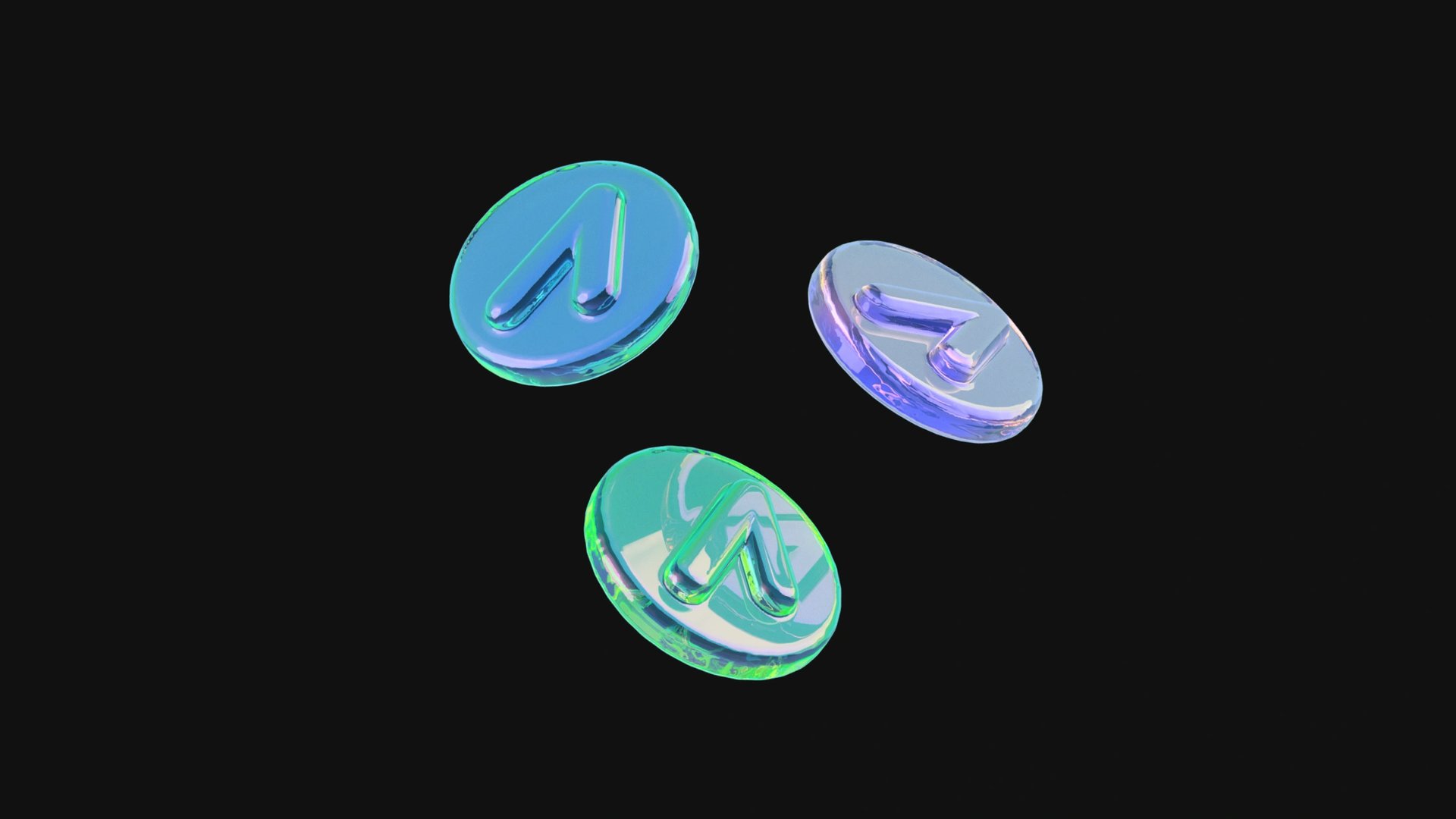 Tokenomics
Tokenomics

$AIOZ Token
The $AIOZ token plays a central role in the AIOZ Network, aiming to reward edge nodes for tasks such as distributing digital content and performing computational processes. In addition to its core functions, the token is involved in innovative concepts like AIOZ Tube, a video-sharing platform designed to innovate content consumption by automatically rewarding creators based on content popularity. The token system also provides a framework for advertisers to incentivize content creators and consumers for attention and data sharing. AIOZ envisions enhancing this model by incorporating new tokens (NFTs), and introducing more intricate and rewarding systems.[14]
Token Allocation
- Private Sales : 7.3%
- Public Sales : 1.7%
- Team : 25%
- Advisor : 5%
- Marketing : 5%
- Exchange Liquidity Provision : 3%
- Ecosystem Growth : 53%[14]
Inflation Schedule
The AIOZ Network's inflation schedule is structured as follows:
- 8% as of December 25, 2023
- 7% as of December 25, 2024
- 6% as of December 25, 2025
- 5% as of December 25, 2026
With a long-term base target set at 5%, the intention is to significantly enhance incentivization for stakeholders in the AIOZ Network. The resulting inflation proceeds will be allocated in the same manner as previously established: 50% directed towards Validators and Delegators, and the remaining 50% allocated to the Treasury. This measured approach aims to balance network growth and stakeholder rewards.[16]
Token Burn
Token burning is structured as follows:
- 50% of ALL AIOZ Network Blockchain Transactions
- 5% of ALL Node Rewards
- 5% of ALL Infrastructure Revenues
- 5% of ALL AIOZ Native dApp Revenues
This systematic token burning strategy aligns with the network's overall sustainability goals and aims to reinforce the token's long-term value proposition.[17]
AIOZ Partnerships
AIOZ x DWF Labs
In March 2023, AIOZ Network partnered with DWF Labs, securing undisclosed investment for its vision of a decentralized content delivery network (dCDN). DWF Labs sees AIOZ Network as a potential foundation for Web3 dApps. AIOZ envisions a trustless decentralized media space, facilitated by the dCDN and rewarded through the AIOZ token.[20]
AIOZ x Keplr
In June 2023, AIOZ Network incorporated the Keplr wallet to simplify user interactions within its decentralized applications (dApps) and asset management ecosystem. This integration allows users to seamlessly join the AIOZ Network and access a variety of dApps. Notably, it facilitates the use of Keplr for signing Ethereum Virtual Machine (EVM) transactions on the AIOZ Network, offering streamlined access to Ethereum dApps like decentralized finance platforms and NFT marketplaces.[21]
AIOZ x Core
In 2024, the AIOZ Network was integrated into the Core ecosystem, aiming to increase visibility among AVAX developers and offer access to DePIN infrastructure tools. Notably, AIOZ W3S, a cloud storage solution utilizing global AIOZ DePIN nodes, provides developers with 1 TB storage and bandwidth free for the initial month. Core, developed by Ava Labs, functions as a central hub for Avalanche-related activities, encompassing wallet extensions, mobile apps, bridging, and staking. AIOZ Network is now listed on Core, presenting developers with cost-effective, dependable, and scalable DePIN solutions. Looking forward, AIOZ Network aims to release four major DePIN products in 2024, powered by AIOZ Network DePIN nodes, representing progress in scalable web3 infrastructure. [18]
See something wrong?
The Agent Tokenization Platform (ATP):Build autonomous agents with the Agent Development Kit (ADK)
